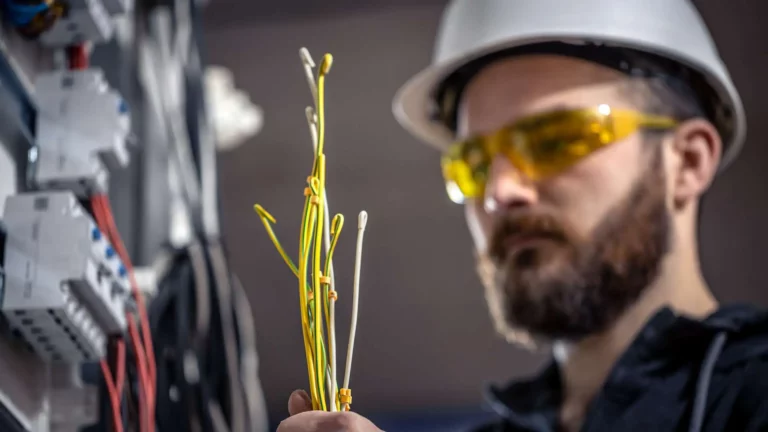Electricians are always in demand. As a result, your earning potential as an electrician is significant, provided you learn everything the right way. This article is a complete guide that will help you understand ways to earn money as an electrician. A side earning in your free time can help you create emergency funds for a stable future. Let us explore how to boost your future funds the right way. Let’s explore how to make money as an electrician.
Ways to Make Money as an Electrician
The skills and knowledge of an electrician can help people save money by taking precautions related to electrical appliances in their homes. Most people seek trustworthy, experienced electricians who can properly guide them and repair faulty connections. With practical efforts, you can explore multiple job opportunities and never go out of work as an electrician.
Read Related Article: How to Make Money as a Travel Affiliate.
How to Make Money as an Electrician: Power Up Your Earning Potential
Understanding Electrician Job Roles
There are two types of electrician jobs available today: commercial and industrial. Most commercial electricians work in residential areas, commercial buildings, and corporate offices. Industrial electricians work in power plants, warehouses, and mines. They are more specialized and work mainly on a contract basis, while commercial electricians have the flexibility to work on contracts, freelance, or both.
Salary Expectations for Electricians by Experience Level
The average earnings for electricians earn up to $58 K annually. The job usually begins at $46K for entry-level electricians and goes up gradually. The highest salary expectation for master-level electricians is around $100 K. You can work as a freelance electrician to boost your salary and save funds for a better future. The hourly wages for electricians are $30-$50.
Factors Affecting Electrician Salaries
Electricians get their pay depending on their location, specialization, and experience. People with master certifications can earn about twice as much as a beginner electrician. You must continue your education and training to boost your earnings. You can specialize and earn more money with side hustles.
Becoming a Qualified Electrician
Education and Training Options
Various training programs and courses are available to help you become a master electrician. Better certifications allow you to earn a higher wage per hour and help you attract more customers with dazzling certifications. You can also enroll in education courses to sharpen your skills and become up-to-date with the latest technology.
Licensing Requirements for Electricians
Licensing requirements for electricians differ from state to state, as well as their specifications. Once you have completed your training course, you must work to achieve work experience in your specialization to earn your license.
A residential electrician must have at least 4,800 hours of work experience in at least two residential specialties, and a general electrician must have 8,000 hours of work experience. They also must have completed 720 hours of classroom training. However, some states do not require a license as an electrician, but it’s better to have one, as it allows you to get work opportunities outside state borders.
Continuing Education for Electricians
A professional training and education program allows electricians to stay updated with the latest technology. They can revisit the latest codes and regulations. With technological advancements, you must keep learning and attend regular classes to understand current laws, best practices, and safety requirements.
Read Related Article: How Do Free Games Make Money.
Building Your Electrician Skills
Mastering Electrical Fundamentals
A master electrician has all the required qualifications for circuitry, electrical codes, and the latest safety protocols. As a master electrician, you must stay updated with the latest electrical laws and regulations to guide others with your knowledge and experience. Electrical fundamentals are a must to know an expert electrician, and they must also have an additional understanding of the latest equipment and appliances to work with them.
Specialization Options for Electricians
Electricians can work in various specializations and select one to get their master’s certifications. They must explore all options well before their specialization. They can get specializations in low voltage, solar panels, smart home systems, and various other latest specialization certifications.
Developing Communication and Customer Service Skills
The side hustles you work as a freelance electrician come with a list of requirements. One of these is communication skills. As you deal with clients one-on-one, you must understand how to convince them and help them with their issues. You must have excellent communication skills to build great relationships with your clients.
Finding Electrician Jobs and Clients
Joining Electrician Unions and Trade Associations
Electricians’ jobs often require networking opportunities to expand your customer base and have great connections. You can start this networking journey by joining electrician unions and trade associations to reach out to fellow electricians and learn new things from them. You can also make friends and join new certification courses with them.
Searching Job Boards and Classifieds
The best way to have a stable source of income is to have a permanent job and work as a freelance electrician in your free time. However, you can explore the best balance between these per your needs. You can work this way if you are getting sufficient work as a freelance electrician. This will allow you the flexibility and freedom of being your boss.
Building Your Own Electrician Business
Once you have established a client base, networked in the electrician community, and learned the ins and outs of being an electrician, you can start your own business. You can start with a marketing strategy, such as creating a website or social media presence to advertise your services. The next step is customer acquisition, and if you take balanced steps, you can reach the goals you have planned for your business.
Jobs for Electricians
Residential Electrician
Residential electricians handle all electrical work at a residential complex or your home. They can fix faulty wiring, install new appliances, troubleshoot electrical issues, upgrade electrical systems, install fixtures, and wire homes and outlets.
Commercial Electrician
Commercial electricians handle electrical work on commercial properties such as corporate offices, commercial buildings, and other facilities. They work primarily outside office hours and maintain the electrical appliances of their designated commercial complex.
Industrial Electrician
An industrial electrician installs, repairs, and maintains electrical equipment at an industrial facility. They also work with high-voltage electrical systems and ensure the safety of electrical controls at their worksite. Industrial electricians primarily work at power plants, factories, and production plants.
Maintenance Electrician
Maintenance electricians perform complex technical work and are involved in installing, operating, maintaining, and repairing electrical systems and equipment according to Electrical Industry codes. They must monitor all electrical equipment and systems and ensure they are working and complying with safety protocols.
Low-Voltage Electrician
A low-voltage electrician works with low-voltage systems such as alarm systems, security systems, and fire alarms. They work usually under 50V and are not at risk of fire or shock. They are experienced with low-voltage devices and manage an area’s data cabling and security systems.
Solar Panel Installer
An electrician with experience in installation, assembly, and setup can work with a solar panel company. These electricians understand solar systems well and can handle the installation process for homes and businesses. They do not work similarly to other electricians and specialize primarily in solar panel installation.
Smart Home System Installer
Smart home systems are the new trend of this technical era. With a smart home system installer, you can upgrade your homes to smart home technology. These include sound-based appliances, movement-sensing lights, and many other unique appliances.
How to Maximize Your Earnings as an Electrician
Negotiating Competitive Rates for Electrical Services
The essential elements of every service provider include price, delivery, quality, and payment terms. One must understand that prices must be transparent from the beginning. It would help if you also kept prices low to attract customers during the beginning stages of business. This way, you can beat other competitors with your affordable prices.
Offering Additional Services to Increase Value
You can add additional services to your customer experience and make them feel like they are getting value for their money. For example, you can provide free electrical inspection services, home automation, and other services or in a combo deal. This will help you acquire more customers and make them trust your services.
Building a Strong Reputation Among Clients
The right marketing strategies can help you become popular in the industry. Offering competitive rates, free or additional services, a customer-friendly attitude, and value-for-money deals can generate positive reviews and help you get referrals for your business. You can create a strong reputation among your customers and expand your business exponentially.
Financial Considerations for Electricians
Taxes for Self-Employed Electricians
Every self-employed individual faces the challenge of managing taxes on their own. They must pay self-employment and additional taxes, including local, state, and federal taxes. However, they can get various deductions and exemptions by understanding taxes better. You can consult a financial advisor to better learn the tax deadlines, deductions, and exemptions.
Business Expenses for Electricians
Tools, equipment, human resources development, utilities, membership, employee expenses, and marketing are all part of the business expenses for an electrician. Some of these business expenses are tax deductible and can help you minimize taxes.
Saving for Retirement as an Electrician
Once you have established a successful business as an electrician, your priority should be to create an emergency fund. Every business owner must think about the financial crisis in the future and plan their budget accordingly. They can invest in retirement planning, the stock market, and various investment options to boost their savings. These funds provide financial stability and act as a lifesaver if a crisis occurs.
Read Related Article: How to Make Money as a Remote Online Notary.
Conclusion
The income of an electrician depends on a variety of factors and situations. It includes their experience, specialization, location, and their client base. However, no matter how small your business is, electricians are always in demand. You can upgrade your income and boost your savings by obtaining an education and getting multiple certifications in electrical knowledge. You can also look for high-demand specialization to earn higher wages per hour.
The electrician can earn up to $50 an hour as a freelance electrician. This can help you boost your savings and provide you with a good source of income. Beem is a great financial tool that can help its users expand their investment options and provide them with financial guidance every step of the way. With Beem, you can get quick funds, manage daily finances, and become a more responsible adult.
FAQs
How much do electricians typically earn?
The average salary of an electrician is around $58K annually. One can earn much more if one works as a freelance electrician in their free time. The master electrician can earn over $100K annually with the right job opportunity. One can boost one’s income source with extra certification courses and work in high-demand specializations.
What steps do I need to take to become a licensed electrician?
One can start by learning the basics of electrical appliances. One must work at least 4,800 hours in two specialized residential fields to become a certified electrician in the residential sector. Every electrician license comes with its own set of requirements. You must keep your knowledge up to date and keep learning to stay in touch with the latest technology, safety protocols, and laws and regulations.
What are the different specializations available for electricians?
The specializations available for electricians include installer technicians, outside linemen, inside wiremen, residential electricians, commercial electricians, industrial electricians, and solar panel electricians. There is a variety of their level of experience and specialization types in each specialization. One can explore the best specializations by researching and getting field experience.





























